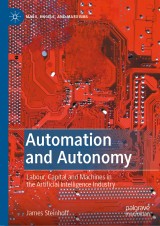Details

Automation and Autonomy
Labour, Capital and Machines in the Artificial Intelligence IndustryMarx, Engels, and Marxisms
|
128,39 € |
|
| Verlag: | Palgrave Macmillan |
| Format: | |
| Veröffentl.: | 21.06.2021 |
| ISBN/EAN: | 9783030716899 |
| Sprache: | englisch |
Dieses eBook enthält ein Wasserzeichen.
Beschreibungen
<p>This book argues that Marxist theory is essential for understanding the contemporary industrialization of the form of artificial intelligence (AI) called machine learning. It includes a political economic history of AI, tracking how it went from a fringe research interest for a handful of scientists in the 1950s to a centerpiece of cybernetic capital fifty years later. It also includes a political economic study of the scale, scope and dynamics of the contemporary AI industry as well as a labour process analysis of commercial machine learning software production, based on interviews with workers and management in AI companies around the world, ranging from tiny startups to giant technology firms. On the basis of this study, Steinhoff develops a Marxist analysis to argue that the popular theory of immaterial labour, which holds that information technologies increase the autonomy of workers from capital, tending towards a post-capitalist economy, does not adequately describe the situation of high-tech digital labour today. In the AI industry, digital labour remains firmly under the control of capital. Steinhoff argues that theories discerning therein an emergent autonomy of labour are in fact witnessing labour’s increasing automation.<br></p><p></p>
1. Introduction: Automation, Autonomy and Artificial Intelligence.- 2. Labour, Capital, Machine: Marxist Theory and Technology.- 3. Post-Operaismo and the New Autonomy of Immaterial Labour.- 4. Industrializing Intelligence: A Political Economic History of the AI Industry.- 5. Machine Learning and Fixed Capital: The Contemporary AI Industry.- 6. A Dark Art: The Machine Learning Labour Process.- 7. New Autonomy and Work in the AI Industry.- 8. Conclusion: Harry Braverman Overdrive.
<p><b>James Steinhoff</b> is a Postdoctoral Fellow at the University of Toronto, Canada.<br></p><br><p></p>
<p>This book argues that Marxist theory is essential for understanding the contemporary industrialization of the form of artificial intelligence (AI) called machine learning. It includes a political economic history of AI, tracking how it went from a fringe research interest for a handful of scientists in the 1950s to a centerpiece of cybernetic capital fifty years later. It also includes a political economic study of the scale, scope and dynamics of the contemporary AI industry as well as a labour process analysis of commercial machine learning software production, based on interviews with workers and management in AI companies around the world, ranging from tiny startups to giant technology firms. On the basis of this study, Steinhoff develops a Marxist analysis to argue that the popular theory of immaterial labour, which holds that information technologies increase the autonomy of workers from capital, tending towards a post-capitalist economy, does not adequately describe the situation of high-tech digital labour today. In the AI industry, digital labour remains firmly under the control of capital. Steinhoff argues that theories discerning therein an emergent autonomy of labour are in fact witnessing labour’s increasing automation.<br></p><p> </p><p><b>James Steinhoff</b> is a Postdoctoral Fellow at the University of Toronto, Canada </p><br><p></p>
Provides a multifaceted Marxist analysis (history, political economy, labour process) of work in the AI Industry Conducts a detailed analysis of how AI is produced Includes interviews conducted with workers and management in the AI Industry
‘<i>Automation & Autonomy</i> adds cutting-edge theoretical and empirical weight to the political economy of algorithmic technology, combining the New Reading of Marx with elements of labour process theory to investigate how employment relations are organized and experienced in the artificial intelligence industry. Rather than granting labour autonomy from capital, Steinhoff argues, new technologies serve to grant capital autonomy from labour, with few of the utopian consequences proposed in contemporary visions of an automated 'post-work' future. Essential reading for those interested in new ways to critically and clear-mindedly comprehend some of the key questions of our time’. (—<b>Frederick Harry Pitts</b>, Lecturer, University of Bristol School of Management, UK)<div><p>‘In this book Steinhoff reveals the profit seeking impulse at the base of contemporary artificial intelligence and provides a timely intervention into debates on digital labour. Arguing againstNegri and other post-operaismo theorists, Steinhoff shows that contemporary changes in technology and forms of social organization are not in the process of freeing “immaterial labour” from the control of capital. Just the opposite: capital is using contemporary technological developments to increase its power over living labour. Anyone interested in the impact of algorithmic automation technologies on the capital/wage labour relationship should read this impressively comprehensive study’. (—<b>Tony Smith</b>, Professor, Iowa State University, USA)</p></div>


















